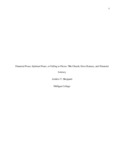| dc.description.abstract | Financially illiterate Christians often fall into the trap of paying excessive amounts of money to financial gurus, especially to ones who unethically equate their brand of advice to good and biblical stewardship. These financial gurus have convinced many Christians that they are walking closer to God if they follow a strict budget and stay out of debt. As a result, Christians are using some of their disposable income to learn how to be better off financially, and believe that taking the advice through an often church-sponsored program, like Dave Ramsey’s Financial Peace University, puts them in a better place spiritually. In reality, these elementary financial disciplines can be learned at minimal or no cost, and certainly without God’s or the church’s endorsement. I will be specifically looking at churches who promote this brand of advice as a part of a spiritual curriculum. My task is to disassociate Dave Ramsey’s teaching from spiritual betterment, mention and discuss possible ethical and theological ramifications of including fee-for-service financial classes in church curricula, make the case for the importance of financial literacy, and suggest solutions regarding the use of financial planners for financially illiterate people. | en_US |

